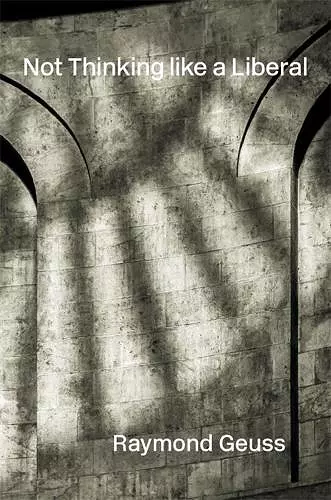Not Thinking like a Liberal
Format:Hardback
Publisher:Harvard University Press
Published:27th May '22
Should be back in stock very soon

In a compelling meditation on the ideas that shape our lives, one of the world’s most provocative and creative philosophers explains how his eccentric early years influenced his lifelong critique of liberalism.
Liberalism is so amorphous and pervasive that for most people in the West it is background noise, the natural state of affairs. But there are nooks and crannies in every society where the prevailing winds don’t blow. Raymond Geuss grew up some distance from the cultural mainstream and recounts here the unusual perspective he absorbed: one in which liberal capitalism was synonymous with moral emptiness and political complacency.
Not Thinking like a Liberal is a concise tour of diverse intellectual currents—from the Counter-Reformation and communism to pragmatism and critical theory—that shaped Geuss’s skeptical stance toward liberalism. The bright young son of a deeply Catholic steelworker, Geuss was admitted in 1959 to an unusual boarding school on the outskirts of Philadelphia. Outside was Eisenhower’s America. Inside Geuss was schooled by Hungarian priests who tried to immunize students against the twin dangers of oppressive communism and vapid liberal capitalism. From there Geuss went on to university in New York in the early days of the Vietnam War and to West Germany, where critical theory was experiencing a major revival.
This is not a repeatable journey. In tracing it, Geuss reminds us of the futility of abstracting lessons from context and of seeking a universal view from nowhere. At the same time, he examines the rise and fall of major political theories of the past sixty years. An incisive thinker attuned to both the history and the future of ideas, Geuss looks beyond the horrors of authoritarianism and the shallow freedom of liberalism to glimpse a world of genuinely new possibilities.
By intertwining autobiography and conceptual critique, Geuss underlines the idea that in order to gain a critical perspective on liberalism, it is necessary to become almost bilingual: able to speak the language of liberalism while also becoming fluent in the vocabulary of its critique. -- George Hoare * Times Literary Supplement *
Thought-provoking…Though he doesn’t propose an alternative to liberalism, Geuss lucidly analyzes its shortcomings and sheds valuable light on how the critical mind is formed. This probing intellectual memoir will appeal to those who believe philosophy can change the world. * Publishers Weekly *
Fascinating…Not Thinking like a Liberal deserves to be a classic. It is at once relatable and profound, humane and auspicious. In his best moments, Geuss offers his own life as a challenge to readers to think differently and more imaginatively. -- Matt McManus * Jacobin *
Geuss’s bleak philosophical anthropology, or his broad, skeptical account of human powers and interests that is aimed at challenging the hubris of abstract theorizers, is compelling. His account of the unusual formation of his own intellectual and political sensibility is both moving and illuminating. -- Richard Eldridge * Los Angeles Review of Books *
Over the past few decades, Raymond Guess has cultivated a reputation as one of the left’s most iconoclastic and individual thinkers. As a result, Not Thinking like a Liberal provides a timely autobiographical account of Guess’ intellectual development, sketching out his discomfort with the idea of liberalism and how his history and his thinking have converged…It is the ideal introduction to Geuss’ thought. -- Theo Stone * Marx & Philosophy Review of Books *
There are many who regard themselves as liberal when it comes to opposition to the usual dogmatic authorities but who can’t identify with the liberalism of either contemporary Western capitalism or a dominant trend in recent political philosophy. Raymond Geuss’s remarkable book will be a clarificatory opportunity. It’s no straightforward polemic against liberalism but rather a typically insightful and persuasive guide to the philosophical resources that have guided Geuss himself toward his very distinctive position. -- Brian O’Connor, University College Dublin
Over the past few years, Raymond Geuss has attained striking mastery in positioning himself within current political philosophy by reviewing autobiographically the stations of his own intellectual development. In this new book, the talent this sort of writing needs undoubtedly hits its peak: by recollecting his upbringing in a small Catholic boarding school and his encounters with a few ingenious philosophers, Geuss eloquently and pointedly sums up the canon of aversions he has developed over the years to prevent him from becoming a liberal and persevering instead with the viewpoint of an estranged participant. There is more to learn about ethics, politics, and philosophy from this acute, expertly paced and plotted book than from dozens of scholarly studies on the same themes. -- Axel Honneth, Columbia University
Raymond Geuss’s philosophical memoir is an instant classic—a profound and iconoclastic story of how his fascinating formation evades any form of liberalism or authoritarianism! Geuss is the last great figure of the second golden age of American philosophy, yet his Hungarian Catholic beginnings and his Adorno- and Celan-influenced philosophy put him in a class of his own. This book is an intellectual feast and an existential feat! -- Cornel West, Union Theological Seminary, New York City
ISBN: 9780674270343
Dimensions: 210mm x 140mm x 20mm
Weight: 386g
224 pages